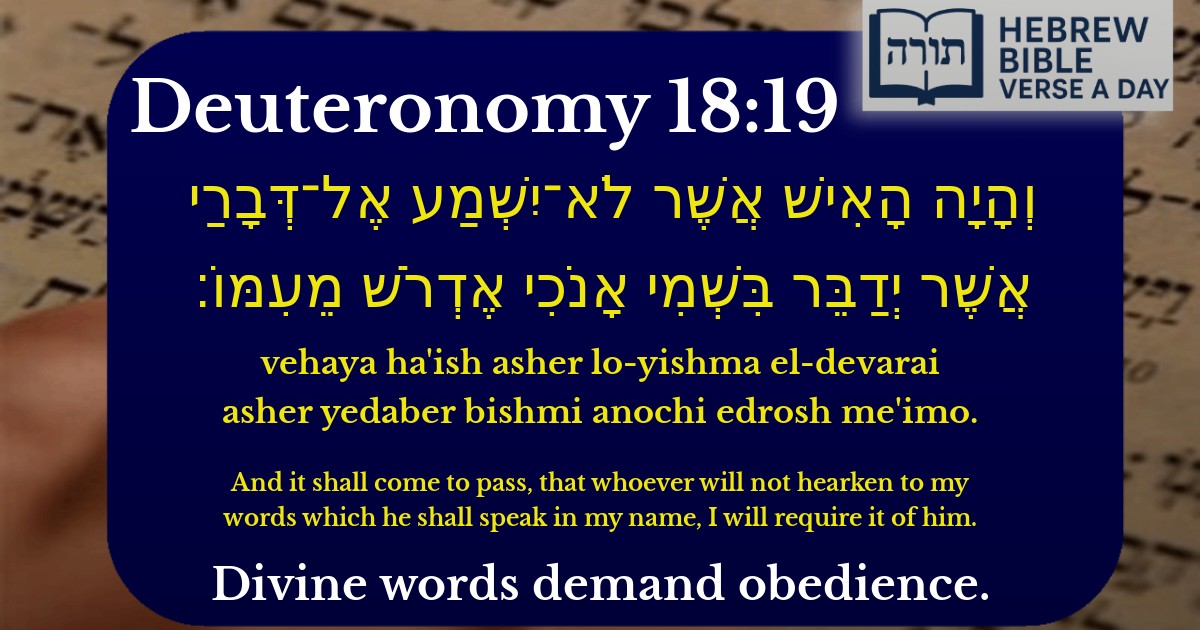Frequently Asked Questions
Q: What does Deuteronomy 18:19 mean?
A: Deuteronomy 18:19 warns that if someone does not listen to the words of a true prophet speaking in Hashem's name, Hashem will hold that person accountable. According to Rashi, this emphasizes the seriousness of ignoring divine messages delivered through legitimate prophets.
Q: Why is listening to a prophet important in Judaism?
A: In Judaism, a true prophet is a messenger of Hashem, conveying His will. The Rambam (Maimonides) explains in Hilchos Yesodei HaTorah that rejecting a genuine prophet is akin to rejecting the Divine command itself. This verse underscores the obligation to heed authentic prophecy when it aligns with Torah principles.
Q: How do we know if someone is a true prophet?
A: The Talmud (Sanhedrin 89a) and Rambam outline criteria for a true prophet: their prophecy must not contradict Torah law, they must be morally upright, and their predictions must come true. Deuteronomy 18:20-22 further clarifies that false prophets are those who speak falsely in Hashem's name or promote idolatry.
Q: Does this verse apply today if we don't have prophets?
A: While we do not have prophets today as in biblical times, the principle still applies to Torah scholars and halachic authorities. The Midrash (Sifrei) and later commentators explain that we must respect and follow authentic Torah leaders who teach in accordance with tradition, as they continue to transmit Hashem's will.
Q: What is the consequence of ignoring a true prophet's words?
A: The verse states that Hashem will 'require it of him'—meaning divine accountability. Rashi explains this as heavenly punishment. The Talmud (Shavuos 39a) also teaches that the entire Jewish people are interconnected, so disregarding prophecy can have broader spiritual consequences.


Context in Devarim (Deuteronomy)
The verse (Devarim 18:19) appears in the context of Moshe's discussion about true and false prophets. It serves as a warning to those who disregard the words of a legitimate navi (prophet) who speaks in Hashem's name. The Torah establishes the authority of a true prophet and the severe consequences for ignoring his divinely inspired message.
Rashi's Explanation
Rashi explains that this verse refers to a prophet who speaks in Hashem's name. The phrase "I will require it of him" means that Hashem will exact punishment from the person who refuses to heed the prophet's words. Rashi emphasizes that rejecting a true prophet is equivalent to rejecting Hashem Himself, as the prophet is merely conveying Hashem's message.
Rambam's Perspective (Hilchos Yesodei HaTorah)
In Mishneh Torah (Hilchos Yesodei HaTorah 9:1), Rambam rules that one who denies the prophecy of a true navi or refuses to listen to him is liable for punishment at the hands of Heaven. Rambam connects this to the fundamental principle of Torah min hashamayim (Torah from Heaven), as rejecting an authentic prophet undermines the entire system of divine communication.
Talmudic Interpretation (Sanhedrin 89a)
The Talmud discusses this verse in the context of the laws regarding false prophets. It establishes that a true prophet must be tested by whether his predictions come true (Devarim 18:22), and that one who speaks in Hashem's name without authorization is liable for death. The Talmud derives from our verse that there is a positive commandment to heed a true prophet.
Ibn Ezra's Commentary
Ibn Ezra notes that the phrase "which he shall speak in My name" is crucial - it refers specifically to words that the prophet declares to be from Hashem, not his own ideas. He explains that "I will require it of him" means Hashem will hold the disobedient person accountable, either through heavenly punishment or through the courts if the prophet's words involved a specific commandment.
Practical Halachic Implications